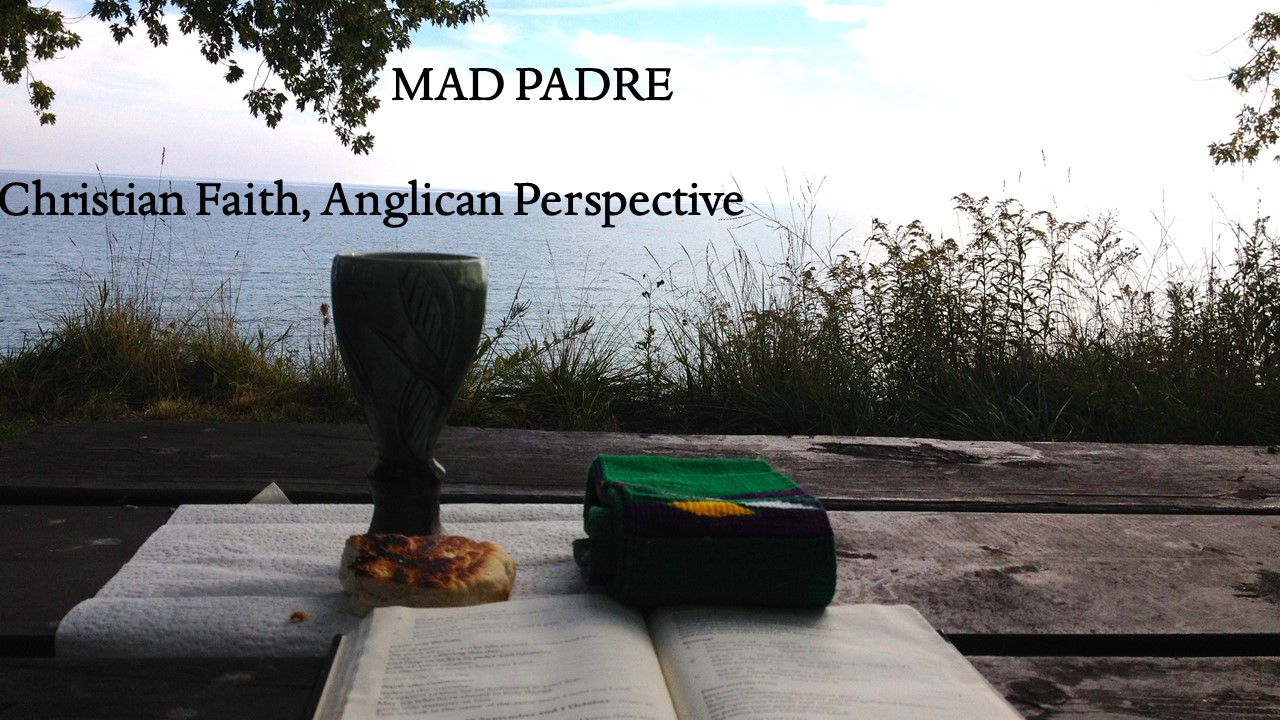Preached at Christ The King Chapel, CFB Suffield, Crown Village of Ralston, AB, 31 March, 2013. Readings for Easter Sunday (Year C): Acts 10:34-43, Psalm 118:1-2, 14-24, I Corinthians 15:19-26, Luke 24:1-12
The last enemy to be destroyed is death. (1 Corinthians 15:26)The obituaries put it politely: (Mr. Smith or Ms. Jones passed away after a gallant battle against cancer" or something similar. A tshirt I saw in hospital recently put it more vigorously, placing a well-known four letter word before the word cancer. Both the obituary and the t-shirt capture the idea of cancer and other horrible forms of death as enemies, as foes to be battled, but I like the inherent hostility and defiance in the tshirt. It is well that we are reminded, honestly, that death is the enemy, a vicious, implacable, contemptible foe, and we do well to be reminded of it.
When my children were little we saw the Disney film "The Lion King", which celebrates a vision of "the circle of life". Animals are born, they live and procreate, they eat other animals and they die, but all is encompassed within a grand, cyclical view of nature as a continuous process of death and rebirth. Or, as one critic unkindly but smartly put it, the film said that "it's ok to be prey". At Easter, which falls dramatically within the season's cyclical turn from the death of winter to the rebirth of spring, it can be tempting to buy into this idea that death is part of a natural cycle. That idea is wrong. Easter is the first victory over death, the first promise that this enemy of God and of humanity will e overthrown.
Our reading from 1 Corinthians comes as part of Paul's attempt in chapter fifteen to explain to the Corinthian church what the resurrection of Jesus means for those who follow him. Paul tells them that all their faith is built on several facts. Fact 1: Jesus was dead, dead as a doornail. Fact 2: god raised Jesus from the dead, just as Jesus said he would do. Fact 3: Jesus is the first to be resurrected, and is part of God's plan to save all who believe in him from death. Fact 3 explains why Paul calls Jesus the "first fruits"Paul's language about Jesus being the "first fruits" of God's victory over death. This is but the first victorious skirmish in God's larger rout and defeat of death.
Paul's strategy in preaching the resurrection is full of risk but it is honest. His risk is that if we choke on the sheer implausibility of the resurrection, if we don't buy the news that Jesus rose from the dead, then the whole project collapses. If, as Paul says, we believe in a guy that it is still dead, then we are pathetically wasting our time. It was ever thus. In Luke's gospel, we heard that when the women return to the disciples and tell of the empty tomb, their words are dismissed as "an idle tale". Go from this chapel and tell others of the resurrection and you will be dismissed by many. We only believe because we have some sense of the reality of the resurrected Jesus in our own encounters with him, and this leads me to my final point, that the reality of the resurrection also depends on us.
I said a moment ago that our second lesson is part of a sermon to the Corinthian church. Paul is challenging this church to live as if the resurrection was a life changing fact. Paul's comparison of Christ to Adam is the hinge on which this fact swings. Adam is humanity as we are, making bad choices, ignoring God, resigned to our fate and accepting death as a fact. Christ is God's new humanity, the first vision of what we might call Creation 2.0 where we are remade in the likeness of Christ, which is to say, we will be different.
Think about the reality of the world as you know it know. The world is full of death, because we choose to make death a reality. Adam, that is to say, humans, choose a world of stark and vast inequality, where some are stuffed with wealth and millions die of poverty and starvation. Adam (humans) sells billions of dollars in arms to perpetuate conflicts that need not occur. Adam arms child soldiers and sends them into battle. Adam feels the need to arm himself with weapons with hundred round magazines because Adam can't find a political solution to violence in society. Adam celebrates visions of death and violence in film, television, and gaming. Would that it were as simple as a world where death is merely a natural event, but in fact Adam (humanity) is an active participant with death.
The church is an alternative vision of the world where life is the reality. It is the place where believers say that we want to let go of Adam and step into our new identity with Christ. Easter is our call to step into this new reality. As Christians we can decide that we will live our lives in the reality of the resurrection, which means that we don't fear our own deaths, but also means more than that. Living in the resurrection means that we offer a new reality to the world, a way of living, an ethic that embraces what we might call resurrection values. Resurrection values include hope, persistence, and a refusal to accept things such as the ones I've just mentioned as the inevitable apparatus of death. Living by resurrection values means that we don't accept the world as it is, and we strive to show to others, iwho are defeated and oppressed by the reality of death, that their enemy is in fact defeated.
- Posted using BlogPress from my iPad




